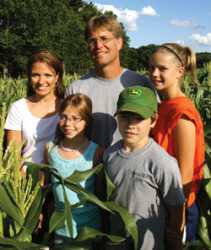Driven To Succeed

Even at the tender age of 11, Brian Campbell of Berwick, PA, knew what he wanted to be when he grew up. That year, he planted an acre of sweet corn, watched it grow, harvested his crop, and took the fruits of his labor to the local farmers market. The experience only piqued his interest in agriculture even more.
When Campbell was 14, he opened his own produce stand on a main road in town. The name of the farm stand, Farmer Moofy, comes from Campbell’s childhood nickname, which revolves around a cartoon cow named Moof that had a speech impediment. Campbell’s sweet corn sales soared, resulting in an article that ran in the local paper titled “Moofy Makes Moola.” He continued to sell sweet corn, tomatoes, and other vegetables at the stand throughout his college years.
In addition to having a passion for agriculture at a young age, Campbell also was drawn to wrestling. In fact, he was the runner up at the state finals his senior year in high school. He then went on to wrestle at Penn State University.
With wrestling, he recalls, “winning is never good enough. You have got to continue bettering yourself. Look back and see what areas you can do better.”
It is a similar situation with agriculture, he adds. “I have a huge drive to succeed.”
Campbell must have picked up his work ethic from his father, a medical doctor who also had a 200-acre beef and grain farm. One of six kids, Campbell was the only one who had an interest in farming. After graduating from Penn State with a degree in agriculture, Campbell’s farming career got a jumpstart when a neighboring farm went out of business and he was able to rent 220 acres.
When he started out on his own, Campbell used his father’s farm equipment as one way to conserve his own capital. “My dad told me, ‘you have to walk before you can run.'”
Producing Profits
Heeding that advice, Campbell learned quickly that simply knowing how to grow crops wasn’t enough. He needed to learn about marketing. He recalls a time when he grew pumpkins for another area grower.
“I did all the hard work,” he says with a laugh. “There is no future in having someone else market the pumpkins and take the majority of the profits.
“Marketing is all about developing trust,” he continues. “That is why I’m here today. I decided that I should contact Wal-Mart to find out about getting my pumpkins into their stores. It took 50 phone calls to find out who I needed to contact, but I got there.”
In addition to Wal-Mart stores in the Northeast, about two years ago Campbell was able to supply pumpkins to Sam’s Club. “My pumpkins are now sold throughout every state in the Northeast,” he adds.
His sweet corn also is sold at Wal-Marts in the Northeast. Recently, his marketing persistence paid off with Giant supermarkets, and he now sells his sweet corn in Giant stores in Pennsylvania and Maryland.
To make sure he has sweet corn ready for his local markets, which includes Farmer Moofy’s, Campbell grows a few acres under plastic to have some available for the local market a week or two before the competition. The remainder of his acreage, however, is not grown under plastic.
Hands To Harvest
In addition to sweet corn and pumpkins, Campbell opted to plant 100 acres of broccoli last year. This year, he has upped that acreage figure to 300. As he grows the operation, so does his need for labor.
Coincidentally, it was just two months ago that the final rule for the H-2A program was announced. According to some in the industry, the Department of Labor’s reversal of the Bush Administration changes to the H-2A guest worker program could result in a court battle. The rule has the potential to make things more difficult for growers to find the labor they need, as they will now have to make additional efforts to offer farm jobs to Americans first. As many growers will agree, most Americans do not want those jobs.
Campbell, however, has a positive outlook on the labor situation. “I look at it a little differently than most people,” he explains. “I will just need to spend more time and effort getting the workers here and making sure we give opportunity to U.S. citizens first to work on the farm. It is just part of the process of obtaining foreign workers.”
Campbell began using the H-2A program about two years ago and brought in 15 workers. Last year, he had 24. This year, he is bumping up that number to 48.
Campbell points to the program’s main benefit: peace of mind via a steady workforce. He says that through the program he has a “consistent workforce that is here to provide harvesting labor for a given period of time, and they are here to work for our farm only. There is no worry of having them take off to work somewhere else.”
Farming In The Future
Another way Campbell maintains his peace of mind is to always be thinking ahead. Last summer, he hired a farm production manager to take some of the work off his plate. It almost goes without saying that it is a difficult task to plant, harvest, market, and tend to all the details in between.
“Hiring a farm production manager was important for me to move the operation forward,” he says. “I need more management here — not tractor drivers or laborers.”
As someone who has been handling all aspects of the farming operation since the age of 14, Campbell knew it was time to get some help.
At this time of year, especially, he says, he needs to focus his time on contacting new buyers about the commodities he grows and then convince those buyers to purchase his crops.
Campbell says it is time for him to step out of the tractor. “As we continue to grow the operation, someone has to be outside the tractor and manage people.”










